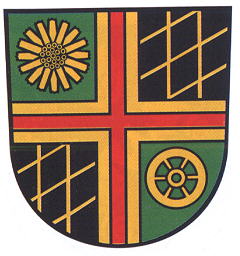Dröbischau: Difference between revisions
Knorrepoes (talk | contribs) m (Text replacement - "Literature :" to "'''Literature''':") |
Knorrepoes (talk | contribs) m (Text replacement - "/Arms of " to "/Arms (crest) of ") |
||
| Line 7: | Line 7: | ||
Additions : 1952 [[Egelsdorf]] | Additions : 1952 [[Egelsdorf]] | ||
[[File:drobisch.jpg|center|alt=Wappen von {{PAGENAME}}/Arms of {{PAGENAME}}]] | [[File:drobisch.jpg|center|alt=Wappen von {{PAGENAME}}/Arms (crest) of {{PAGENAME}}]] | ||
{| class="wikitable" | {| class="wikitable" | ||
Revision as of 08:08, 16 November 2022
This page is part of the German heraldry portal Deutsche Wappensammlung |
Heraldry of the World |
|
German heraldry:
|
Selected collector's items from Germany:
|
DRÖBISCHAU
State : Thüringen
District (Kreis) : Saalfeld-Rudolstadt
Additions : 1952 Egelsdorf
| German |
In von Grün und Schwarz geviertem Schild ein durchgehendes golden bordiertes rotes Kreuz; im Feld 1: eine goldene Arnikablüte, im Feld 2 und 3: ein goldenes Rautengitter, Feld 4: ein goldenes sechsspeichiges Rad. |
| English | No blazon/translation known. Please click here to send your (heraldic !) blazon or translation |
Origin/meaning
The arms were officially granted on July 15, 1993.
The cross is used as a symbol for the Paulinzella abbey, as the village was founded by monks form the abbey. The Arnica flower in the first quarter symbolises the fact that historically many medicinal herbs were grown in the village. The wheel symbolises that the village was situated along one of the main trades roads through Thüringen, as well as the fact that many villagers were coach drivers or -builders. The second and third quarter symbolise the Schiefergebirge mountains.
Contact and Support
Partners:
Your logo here ?
Contact us
© since 1995, Heraldry of the World, Ralf Hartemink 
Index of the site
Literature: Ulle, 1997.












